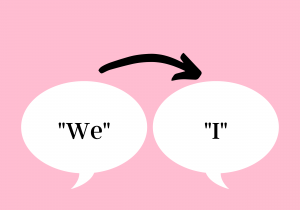
After months of mocking Asian countries for the “China Virus,” no one would have suspected that the United States would adopt a major part of Eastern culture.

America, a country that celebrates independence, has shifted to the community “we” instead of “I.”
But is it for the better?
Since the start of the pandemic, language surrounding the Coronavirus has intentionally been highly community-focused.
Expressions like “we will get through this together” and “CoronavirUS” are just some of the phrases used to encourage togetherness. Phrases promoting unity like this discourage self-motivated individualism over prioritizing the greater good.
Although she is now Zooming Chapman classes from her home in China, international student Jessica Tong, a senior, continues to worry more about her friends and family more than herself.
However, collectivism is not just about relationships.
A 2020 study by the University of Kent found that “people who adopt a collectivist mindset are more likely to comply with social distancing and hygiene practices to help reduce the spread of COVID-19.”
Essentially, when people care more about society as a whole, they are more motivated to protect others.
In theory, this concept would greatly benefit COVID-19 prevention, but there are many obstacles to converting an entire country.
Chapman English Department professor Samantha Dressel shares her disbelief of obtaining togetherness during this time.
Because we have not all come together to fix other science-based global issues, Professor Dressel feels “cynical toward the idea that it could happen for COVID and that we could actually get the ability to work together.”

In its simplest form, that theory goes, the United States needs to to transform“we” to “I.”
Persistent social distancing and stay-at-home restrictions continue to promote Americans’ individualistic tendencies.

For example, sophomore Gigi Sestito, a strategic corporation communications major, has found that quarantine has made her more independent than ever before.
“I have never considered this before, but I think it would make a lot of people recognize they’re strong and capable of getting through this [pandemic] without relying too much on other people,” Sestito said.
On the other hand, Dressel believes that this prolonged period of social isolation will have the opposite effect.
“I think we’ve all gotten to realize how important [physically seeing each other] is,” Dressel said. “People are realizing how much they miss just seeing people and how that has affected their lives and created a sense of isolation.”
Ultimately, as quarantine continues into the remaining months of 2020, it is evident that making predictions about COVID-19’s trajectory is nearly impossible.

Even if language will not be able to impact the pandemic, its role in society will only grow.
“Language during COVID-19 is really important because we’re at a distance. We’re not having face-to-face communication as much,” Dressel said. “When all of that is stripped away, what we’re left with is language, and we only really have that as our option for communication.”
